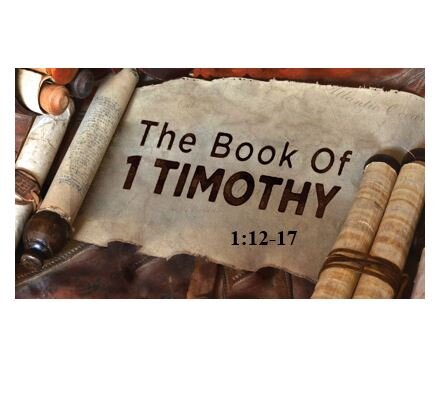BIG IDEA:
FOR THE FOREMOST OF SINNERS, THE PRIVILEGE OF SERVICE AND THE PARADOX OF SALVATION MAGNIFY THE GRACE OF GOD
Def. of Paradox: “a statement or proposition seemingly self-contradictory or absurd, and yet explicable as expressing a truth”;
How could Christ Jesus choose to save someone who was so undeserving as Paul?
How could Christ Jesus exalt such a one to the highest realm of Christian service?
I. (:12-14) THE PRIVILEGE OF SERVICE EXTENDED TO THE FOREMOST OF SINNERS MAGNIFIES GOD’S GRACE AND SPURS THANKSGIVING
A. (:12) Thanksgiving for the Privilege of Service
1. Thanksgiving Based on the Strengthening Provided by God’s Grace
“I thank Christ Jesus our Lord, who has strengthened me”
Pres. Tense — ongoing gratitude; emphatic by position
Wuest: “God clothed him with strength”
2. Faithfulness is the Key to Serving the Lord Effectively
“because He considered me faithful”
This was the Lord’s way of viewing Paul as regards his divine appointment and
enablement (cf. how Christ looked at Peter and said “You are Simon the son of
John; you shall be called Cephas (which translated means Peter).”
This verb followed by the double accusative = “look upon, consider someone or
something” — Acts 26:2; Phil. 2:3,6; 3:7-8; 1 Tim. 6:1
3. Ministry must be seen as a Privilege — a High Calling
“putting me into service”
Much preferred to being put on the shelf
B. (:13) Testimony of the Foremost of Sinners
1. Description of His Former Life — “even though I was formerly”
a. Blasphemer — certainly he cursed the name of Jesus; stood opposed
to the deity of Christ, viewing Him as an imposter
Kent: “denotes evil and injurious speech directed usually against God”
b. Persecutor — Acts 8:3; 9:1-5; 22:4-5; 26:9-11; Gal. 1:13
inflicted physical harm on those who would hold to allegience to Christ
c. Violent Aggressor — cf. Rom. 1:20 — like a bully (Wiersbe)
Campbell: “depicts a person involved in insolent, violent, and
outrageous conduct”
2. Appropriateness of Mercy — “And yet I was shown mercy because”
a. Due to Ignorance — “I acted ignorantly”
b. Due to Unbelief — “in unbelief”
Kent: “In the Old Testament a distinction is made between those who sinned
through ignorance (including moral weakness) and those who sinned
presumptuously (‘with a high hand,’ Num. 15:30, A.S.V.).”
C. (:14) Trumpeting of the Grace of God
1. Abundant Nature of God’s Grace
“and the grace of our Lord was more abundant”
2. Accompanying Faith and Love
“with the faith and love which are found in Christ Jesus”
Hiebert: “standing in contrast to the unbelief and hatred of his previous life,
speak of the change which God’s grace wrought within him.”
II. (:15-16) THE PARADOX OF SALVATION OF THE FOREMOST OF SINNERS PROVIDES AN ENCOURAGING MODEL FOR ALL WHO WOULD BELIEVE
A. (:15a) Global Goal = Christ Came to Save Sinners
“It is a trustworthy statement, deserving full acceptance, that Christ Jesus came into the world to save sinners”
Pre-existence can be implied from this statement of the purpose of Christ’s First Advent
B. (:15b-16) Mercy Model = Christ Saved Me, the Foremost of Sinners
1. Extreme Example — argument from the greater to the lesser
“among whom I am foremost of all”
Kent: “No one can say he is too sinful to be saved since Christ has saved Paul.”
no limit to the transforming power of God’s grace
2. Model of Christ’s Perfect Patience
“And yet for this reason I found mercy, in order that in me as the
foremost, Jesus Christ might demonstrate His perfect patience”
Hiebert: “‘Longsuffering’ is the divine attribute of God whereby He does not at
once punish the sinner but forbears long under provocation and gives him
opportunity to repent.”
3. Intended Audience
“as an example for those who would believe in Him for eternal life”
III. (:17) DOXOLOGY
A. Divine Attributes of the King — the sovereign over all the universe and over both
this age and the age to come
1. Eternal
2. Immortal
Campbell: “one who is not corruptible, imperishable, indestructible”
3. Invisible
B. Worthy Worship of God
1. Honor
Campbell: “the idea of putting a high price on God, esteeming him to be of
supreme value, and acknowledging that he is worth more than everything else”
2. Glory
Towner: “Testimony leads to worship”
C. Duration of the Worship — “forever and ever”

